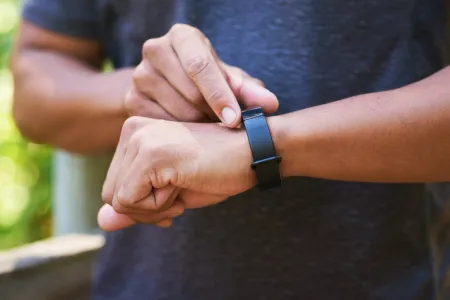Can your smartwatch get hacked? Study shows what information is at risk
Smartwatches might be good for tracking steps and heartrates, but they can also offer hackers a wealth of personal information to exploit, according to a new Charles Darwin University (CDU) study.
Researchers in the study hacked into a variety of smart wearable devices, valued between $25 and $150, to understand the vulnerabilities of this technology and what information can be accessed and exploited.
These devices allow people to track their health, monitor their fitness, conduct medical tests and more but often use Bluetooth Low Energy (BLE) technology, which sacrifices security for low energy consumption.
Study supervisor Dr Bharanidharan Shanmugam, who is a Lecturer in Information Technology at CDU’s Faculty of Science and Technology, said researchers were able to connect to the devices and gain access to data and had the ability to manipulate it.
“We could bring a pulse down or up, we could see where a person has gone, where they’ve spent time and other medical readings like heartbeat, Blood Pressure and ECG readings” Dr Shanmugam said.
“This data can be pushed to medical companies, used for targeted marketing, or can be used to develop a profile on a user.”
Dr Shanmugam said given the rising popularity of smart wearable BLE devices, manufacturers needed to make it a priority to implement robust security mechanisms.
“The assertion that smartwatch makers are not taking security seriously is a significant concern,” Dr Shanmugam said.
“If this trend persists, it could lead to a cascade of negative consequences for both individuals and society. Potential consequences are increased identify theft and financial loss, as any breach could expose personally identifiable information to cybercriminals leading to identity theft, financial fraud and unauthorised access.
“There’s health data violation. If the data fall into wrong hands, it could be used for blackmail or even physical harm especially for elders, and there’s corporate espionage. Compromised devices can allow competitors or cybercriminals to steal valuable intellectual property. A massive volume of lawsuits stemming from these incidents could potentially bankrupt the company.”
The study was conducted with Christ Academy Institute for Advanced Studies in Bengaluru, India.
Vulnerability Analysis and Exploitation Attacks on Smart Wearable Devices was published by the Institute of Electrical and Electronics Engineers.
Related Articles

Nanoplastics hindering cognitive abilities of fish, international research shows
Nanoplastic exposure can impair the cognitive abilities of fish and could lead to significant impacts on marine species’ ability to survive, according to a new international study.
Read more about Nanoplastics hindering cognitive abilities of fish, international research shows
New project to grow Indigenous aquaculture on one of Australia’s largest islands
An Australian island’s efforts to improve food security and transition into a blue economy will be bolstered by a new project to propagate a nutritious and increasingly popular fish.
Read more about New project to grow Indigenous aquaculture on one of Australia’s largest islands
Potential for satellites and AI to help tackle critical invasive species problem
Satellite imagery and artificial intelligence can detect with high accuracy two invasive weed species in Australia, posing a new opportunity for defense against these pervasive plants.
Read more about Potential for satellites and AI to help tackle critical invasive species problem
